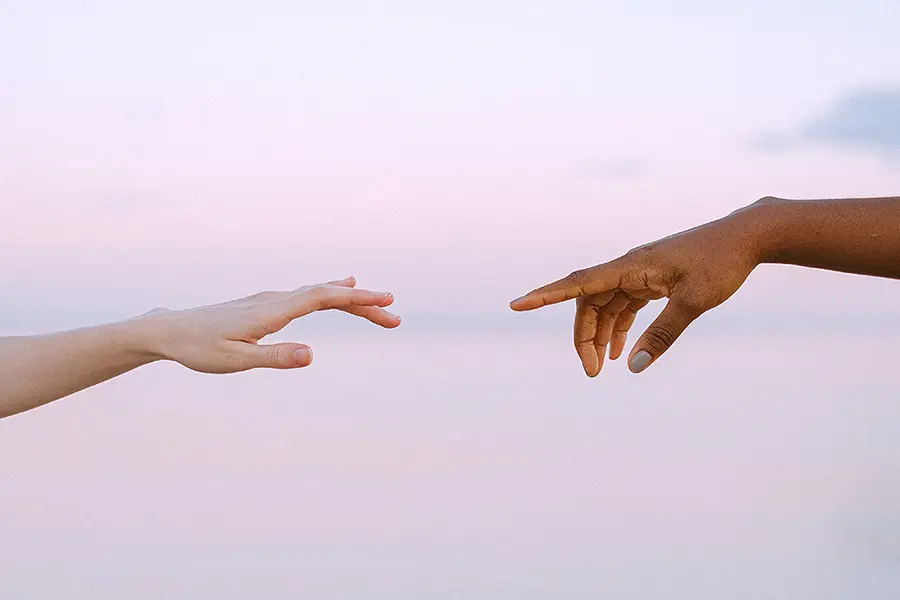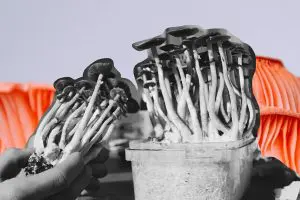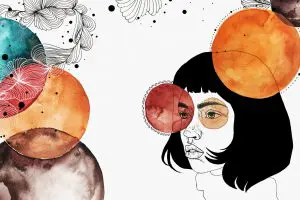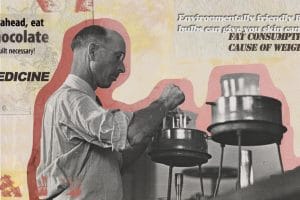It’s not everyday a doctor uses the word “soul.” In fact, psychiatrist Julie Holland used to shy away from the term—but with the mainstreaming of psychedelic medicine, our country’s loneliness epidemic, and the uptick in isolation caused by COVID-19 and the divisiveness of left-versus-right, it’s now more prescient than ever to investigate matters of soulful malnourishment, and how that impacts the rest of our physical health.
In her latest book Good Chemistry: The Science of Connection, from Soul to Psychedelics, Holland explores how feeling connected—with yourself, with a partner, with family, with community, with nature, and with the cosmos—impacts your health. Indeed, it’s simple: Feeling connected, be it with the help of meditation, socializing, psychedelics, or other methods, puts your nervous system in the parasympathetic mode, a state of relaxation and repair. Feeling isolated and disconnected, which leads to a constant state of fight-or-flight, puts you in the sympathetic mode. And the tangible difference, for your body, and yes your soul, is real.
We caught up with Holland to discuss her book, its relevance to the current moment, and the promise of psychedelic therapy.
DB: So Good Chemistry is coming out at an interesting time in American history. How do the themes of the book relate to the current moment?
JH: I was a little bit worried with the timing of things. This is a book that really prioritizes physical interaction over digital, and I make a strong case for that. Skin-to-skin contact is what’s best for us—for our bodies, our souls, our psyches. So some of the advice in the book I was worried was now sort of medically inaccurate. The other parts of the book that were right in terms of timing is that certainly people are more and more open to thinking about psychedelics as being therapeutic medicines.
And I do talk in the book about the polarization of America and left versus right. I also talk about how difficult it is to be in relationships or in a marriage or in partnerships—how hard it is to be with your family. All those things still apply now more than ever. There is a lot of good advice in Good Chemistry for how to get along with yourself and other people—those two things are related.

The country was founded on the genocide of the native population and then slavery and then treating immigrants terribly. For the nation to be able to process its own trauma would be really good for everybody.
And the other thing I talk about, which maybe was prescient, was this idea of our nation’s childhood wounding. Many of us in the psychedelic community understand fully or deeply how a history of trauma can have an impact on behavior. Our nation has childhood trauma, our nation has to process, debrief, and come to terms with its own trauma. That’s what’s happening now with the Black Lives Matter protests. People are really copping to the fact that the country was founded on the genocide of the native population and then slavery and then treating immigrants terribly. For the nation to be able to process its own trauma would be really good for everybody.
So, while psychedelics can help treat PTSD, not everyone has access to this kind of therapy. If not in a therapeutic program, psychedelic or otherwise, how can the average person treat their trauma?
I don’t recommend psychedelic therapy for everyone. People must be able to discuss the fact that they were traumatized or that they are traumatizers. We all have the flip side. Many of us who were traumatized went on to become traumatizers. You don’t need psychedelics to unpack that. You need a safe space to explore very difficult concepts and difficult experiences. The first thing you need is a sense of safety.
How to Grow Shrooms Bundle
Take Both of Our Courses and Save $90!
The one reason I love MDMA-assisted psychotherapy for processing trauma is that the pharmacology enables people to feel safe. It’s a key part of being able to do this deep therapeutic work. Because MDMA enables these high levels of oxytocin, that trust and bonding [with the guide or therapist] is really sort of accentuated. Also the amygdala—the fear center—is quieted, and oxytocin tamps down the fear center.
In psychedelic science, specifically with regard to the “mystical experience,” one of the main themes we talk about is “oneness.” How do you accomplish a state of oneness? What does that even mean?
You can have a state of oneness in a lot of different scenarios. You can feel one with nature. You can feel one with another person, where you really feel that between the two of you “you complete me” in a sense of being unified or united. Perhaps you feel that when you get married, or you may feel at one with your baby when you’re nursing. But you can also feel one on your own as a single person. You can feel at peace with yourself or feel embodied or you can feel this state of blissful unity with everything when you’re meditating or when you’re in a state of flow when you lose yourself in a project.
With psychedelics, especially, for many people, at some point during the experience, there is this epiphany that everything is connected—that we’re all tiny little beings on a huge planet. If you pull back and see the big picture, you see that we are all one organism, interconnected or interdependent. Some people will have this sense that love is the answer, or that love is the thing that connects us or that we’re all connected by the same energy or that my atoms and yours intermingle because everything is in motion. You have this supreme sense of knowing that everything is connected and you’re part of it. You have this sense of oneness. It’s a transcendent experience. It can be a very powerful experience.
People come away with this sense of oneness, of feeling connected instead of disconnected. That’s crucial for keeping your body in the parasympathetic state and not slipping over into the fight-or-flight sympathetic state. Feeling that you belong, that you’re part of something bigger than you—those things can make you feel safe. The human species is categorized as obligatorily gregarious, which means that we’re obligated to cooperate and be social. We have to be social in order to survive. Oxytocin helps us to be social. When we are social, we are in the parasympathetic state. It’s the only time when our bodies can relax and repair ourselves, rest, and digest. Belonging puts you in para. When you’re shunned, you’re in fight-or-flight.
People come away with this sense of oneness, of feeling connected instead of disconnected. That’s crucial for keeping your body in the parasympathetic state and not slipping over into the fight-or-flight sympathetic state.
This sense of being connected has direct effects on our physical health. When people are isolated, they’re less healthy: Their blood pressure is higher, they have ulcers, they don’t sleep well. Isolation affects metabolism, immune system, and your ability to learn. In these animal studies, if you put a rat in a cage with other rats, it won’t self-administer drugs in the same, compulsive way. We know that isolation is a risk factor for problematic behavior with drugs—what other people would call addiction. Isolation is a set up for addiction. We’re more paranoid and less social when we’re isolated. It creates a feedback loop: As you get isolated, you’re in fight-or-flight, you’re less open to being social, you’re paranoid, you’re less open to receiving information and cooperating.
I really get worried now with the pandemic and everyone being more isolated. It’s a setup for more depression, anxiety, addiction, and polarization. The more isolated you are, the less exposed you are to other ways of thinking. You’re physiologically not primed for learning and integrating new information if you’re isolated and in fight-or-flight.
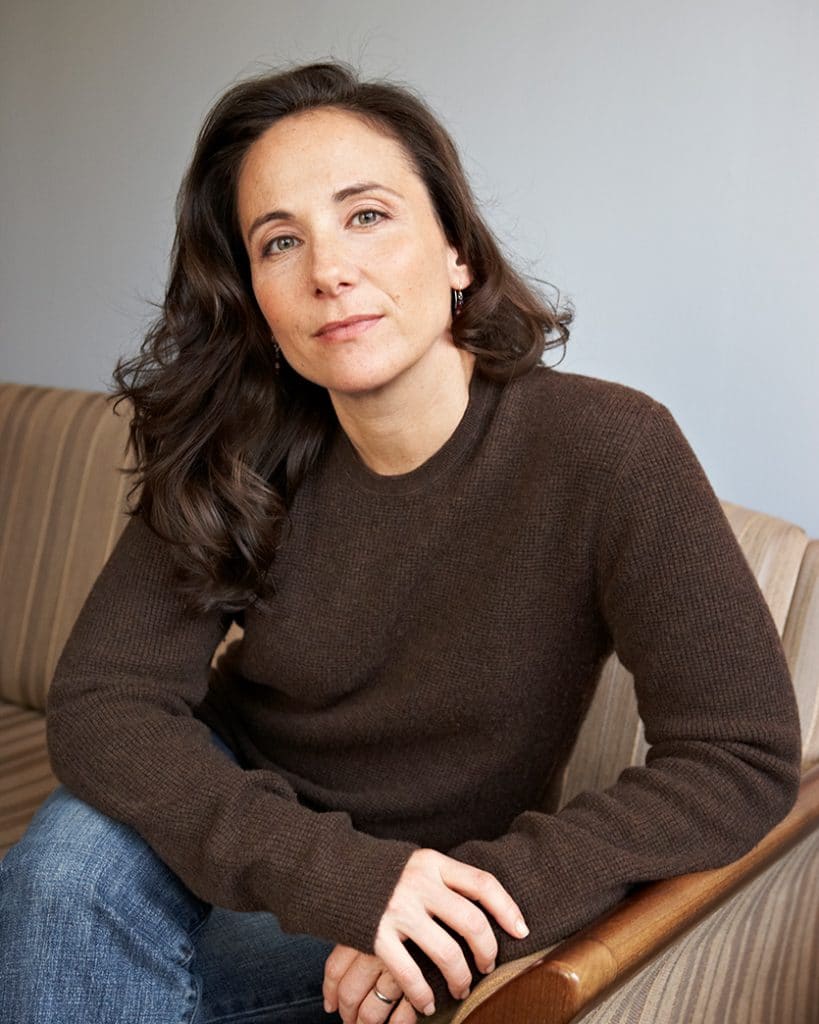
So I’ve been excited to ask you this question: How do you define the soul?
I don’t know that I have a great definition for the soul. I think of it as the essence of somebody, the thing that animates them. I’ve seen people being alive and dead. A dead body is missing something: the spirit of the thing that animated the meat puppet. In my office, I rarely used to use the word soul. In the old days, I’d preface it by apologizing ahead of time, or say that I’m going to use a word that psychiatrists don’t often use or I’d use air quotes. But lately, I don’t feel like I have to do that; the word is everywhere and I don’t have to make excuses for it as much.
You can’t really extricate the body from the mind and the body from the soul, and I’m sort of okay with trying to bring the idea of soul back into psychiatry. We don’t call it nourishing the soul or healing or soothing the soul, but that’s a lot of what we try to do with people and it is a good shorthand. If I say to somebody, what feeds your soul, they know I’m not talking about “what did you eat for breakfast?” It can cut through some of the clouded talk to get to what really matters with somebody—what encourages them or what blocks them, what is their truest essence.
Do you think that psychedelic science is helping physicians better acknowledge the word soul?
They’re trying to do everything as science-y as you can, with measurable and reproducible results. In terms of the research, there’s no room for the concept of soul right now. But we know that for some people who experience these medicines, it does feel like a soul medicine to them.
And then there’s the whole scientifically defined “mystical experience,” which relates to that…
So having a mystical experience means that you are probably going to come away with talking about things like your soul, even if you weren’t thinking in those terms before. With the classic mystical experience, you have the void and you have the light. During the light part, that is when you have this sense of oneness and connection. And for many people, they feel like they’re floating in this oceanic boundlessness, this sense of floating in the soup of connection. Many people will just name that thing they’re floating in and call it love. You could say it’s a collection of souls or something. I really have this sense that there’s some sort of source of energy or purity or light or something and that we come from that source and we can go back to that source and that’s what connects everybody.
Read: L’Chaim Psilocybin: How Psychedelics are Reigniting Judaism
In that Johns Hopkins study, they can pretty reliably induce a mystical experience with psilocybin. And that mystical experience has value. It’s always interesting when you see companies trying to separate psychedelic effects from the pharmacological effects. If you’re just mimicking pharmacology without the [psychedelic] experience, you won’t get as robust changes in people’s behavior.
So what does it mean to connect with your own soul?
You can’t be a good partner or parent to someone else if you aren’t fully integrating or connected with your own self. Some of my earliest lessons with altered states was getting a sense that there are a lot of different facets of my personality and needing everyone to be on the same page and the same team. So that meant weeding out the saboteurs. That is sort of the first phase of me doing this psychic house cleaning. One of the early metaphors I used for the MDMA experience was the sense that I was a house where all the lights were on and all the doors were unlocked and I could poke around and see what’s in this closet, what’s hiding here. I felt comfortable because the house was well lit and unlocked, and I felt comfortable to explore these different areas. I think that some people, with MDMA-assisted psychotherapy do realize that they’re fragmented—not all the players are on the same playbook. It can be really healthy and strengthening to have that personal integration before moving on. It’s like this cheesy thing people say that you have to love yourself before you love someone else, but it’s cheesy because it’s also true.
What are the health benefits of having a spiritual connection?
When we are disconnected, we are in the sympathetic side of the nervous system. When you feel connected, it’s better for your body—where it can digest and repair itself. The body does not repair when it’s in fight or flight. From a physiological point of view, you’re more likely to be in the parasympathetic state when we are social. Again, it’s a feedback loop: If you’re in para, you’re open to being social. I also think of this idea of namaste: “my soul honors your soul.” That is a deep connection where you feel like you’re seeing someone or you feel seen by them, accepted, and honored. It puts you in that parasympathetic state.
Oxytocin is good for your body and brain. It helps wound healing and facilitates neuroplasticity, which is the building block of learning and growth and hopefully behavior change. So when we are hooked into community, we feel better. We do better. We are better people. We learn better. And we grow better. When we’re isolated, none of those things happen. One of the reasons I rail against solitary confinement in the prison system is that you can’t model healthy behavior, a sense of connection, and learning. Isolation is pro-inflammatory. And being connected is anti-inflammatory. So you want to do things that decrease inflammation. Certain whole foods, cannabis, and it turns out psychedelics, have anti-inflammatory properties. This is in addition to if you have a good experience and feel connected and unified and have more oxytocin, which is also anti-inflammatory.
What is the main idea you want your readers to come away with?
One of the messages of the book is that being in para is good for you. Being connected puts you in para. Therefore being connected is good for you. I do think it’s important for people to just pay attention to when you’re in para and when you’re in sympathetic. People can’t really fully hear you or take in what you’re saying if they are in the sympathetic mode and you can’t be fully social and connected and empathetic when you’re in the sympathetic mode. For us to communicate with each other about injustices and reparations, there will be a more efficient transfer of information if people can stay in parasympathetic mode.
I absolutely agree that there is a time for demonstrations and chants, no question. But there is also a time to integrate high ideals of what we want into our local governments. I would encourage everybody to have face to face discussions with people who maybe don’t agree with you on everything. I don’t think that social media is necessarily the place where we’re going to change hearts and minds, but I do think that face to face with two people staying in para and finding things that they do agree on can. They can demonize the other person less. We are dividing America into left and right, but you could just as easily divide it into people who want ketchup on egg sandwiches and those who do not. You need to build some sort of commonality and respect and trust if you’re going to have a real exchange of ideas—we’re all just sort of curating our own feeds and liking what we get and getting what we like. I don’t think that’s necessarily a great way to grow as a person or to change.
How to Grow Shrooms Bundle
Take Both of Our Courses and Save $90!

DoubleBlind is a trusted resource for news, evidence-based education, and reporting on psychedelics. We work with leading medical professionals, scientific researchers, journalists, mycologists, indigenous stewards, and cultural pioneers. Read about our editorial policy and fact-checking process here.

DoubleBlind Magazine does not encourage or condone any illegal activities, including but not limited to the use of illegal substances. We do not provide mental health, clinical, or medical services. We are not a substitute for medical, psychological, or psychiatric diagnosis, treatment, or advice. If you are in a crisis or if you or any other person may be in danger or experiencing a mental health emergency, immediately call 911 or your local emergency resources. If you are considering suicide, please call 988 to connect with the National Suicide Prevention Lifeline.
